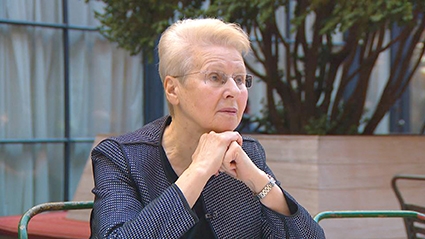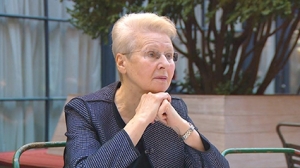Shevtsova on the Tsunami of Change in Russia
Exclusive Interview
On September 11-12, 2018, the McCain Institute and the Economic Policy Research Center (EPRC) co-hosted the 4th annual Tbilisi International Conference in the Georgian capital. This year’s title was “World in 2018: Upside Down?”
The conference brought together regional experts on security issues, Georgian policymakers, civil society activists, and representatives in the private sector “with a view toward keeping Georgia high on the transatlantic agenda and keeping Georgia on track in its democratic progress and transatlantic aspirations.”
At the conference, GEORGIA TODAY spoke to Dr Lilia Shevtsova, an Associate Fellow with the Russia and Eurasia Program at Chatham House, a prominent and worldwide respected scholar when it comes to Russia and the former USSR. She was also the founding chair of the Davos World Economic Forum Council on Russia’s Future. We quizzed her on that future, what it will take for Russia to get there, and how Georgia will fit into it.
At the conference, you mentioned how the perception of Georgia has changed over the years in Russia. How and why?
Russians have become less anti-Western and for me it was a puzzle because 68% of Russians, in this year of sanctions and anti-Western hysteria, demand a normal relationship with the West, and the Russian attitude towards Americans has become much better. Before, it was a 20% positive attitude, but this August 42% showed a positive attitude to the West and, in this context, the perception of Georgia has changed. In 2009, 62% [of Russians] thought of Georgia as an enemy; of course, the result of the hysteria, the Kremlin policy and the war as shown on Russian TV. Now, though, only around seven or eight percent of Russians considers Georgia an enemy; so people do change their attitudes and when I walk on Tbilisi streets, I see many tourists from Russia. Russians are occupying Tbilisi but these are Russian tourists, not tanks.
Some people are angry seeing Russians here; some say the Russian market is unreliable, that any change to our relations with Russia can negatively affect the wine or tourism markets here
I do believe that Georgians are much smarter in this policy than Russians because they open their borders, airports, restaurants, apartments, and houses to Russians, and so the perception has changed. In Russia, I know several families who don’t want to go to Crimea [a previous holiday destination] and choose Georgia instead, but not Abkhazia, as it's too controversial. They say Georgia is the most hospitable nation. I’ve been to Georgia twice with my children. Georgian hospitality changes the moods of Russians towards Georgia and that’s important.
This might change the perception of Russian tourists but how much can it affect the perception up there in the Kremlin?
I’m not sure that the Georgians, Ukrainians nor Russians themselves can change the Kremlin’s view of the world much but we have to understand the logic: Putin cannot backtrack on what he has done and you understand the cycle of such dictatorial people: if you backtrack, you lose face.
Would you agree his refusal to backtrack is what holds him in power?
I would agree but at the same time look at the Russian President: he seems to me, I'm using the term “impotent omnipotence,” meaning that while he has the control, at the same time he's constantly shooting himself in the foot. Take the Skripal case- he lost so much; the pension reform in fact killed his own electorate base; Ukraine - how to get out of that? Syria - supporting Assad. So, on the one hand his policies give tactical gains but on the other hand they bring strategic disaster.
You once compared Putin to the Roman Emperor Nero. It was common practice for Roman emperors to pick a successor well before abdication or assassination. We’re not seeing that trend in Putin’s reign. Why?
New times have brought some modification to this kind of reproduction of power. Putin is likely wondering who can secure his tenure and guarantee his legacy after he is gone. But he is reluctant to point at any one person, most likely to avoid the potential loss of supporters who would gather around his chosen successor after his doing so. This kind of power and system doesn't tolerate any kind of old king-young prince system. There will be no new Medvedev because Medvedev was a temporary solution, while the new Russian President, to legitimize his power, will need to pull down the past and offer it up as a sacrifice, as all Emperors did. [Answer edited for clarity].
For a decade or so we’ve been waiting for a new Russia to emerge from those Russian people who feel they deserve better than the government they have; a new Russia that will be inclined to friendlier relations with Georgia. Will it happen?
This is the million-dollar question. We don't have an answer but at the same time are very skeptical about many things regarding Russia’s trajectory. Looking at the younger generation last Sunday on Moscow’s streets and looking on the web at these teens and people in their twenties in Ekaterinburg, in Petersburg, I do believe that there is a new Russia. I don't know how big it is but even this 68% of Russians who want good relations with the West could be the soil for it. The problem that has emerged is the elite, which has always been the engine of change: in Russia, the elite is much worse than general society and is blocking all change, it's the most cynical of them all and is not ready for something new.
If you were to ask an average Westerner what they picture as the new Russia, they might point to Navalny. Is he the man to bring the change?
I belong to the generation of liberals who have apparently been too idealistic, looking for the perfect man, but I have to admit that even thinking critically about some of Navalny’s rhetoric, I do recognize that he is the only representative of their position who has the courage and charisma to become the leader of the new tribe, of the new tsunami that is coming, and he's the only person who can create a network across Russia: so far he's the only player on our lonely stage and he has to be supported.
What should Georgia expect from Navalny? He says Abkhazia and South Ossetia are independent states, that Crimea should have returned to Russia. These are questions of paramount importance to Georgians
Navalny is a hypothetical option, but in your question I see some concerns and worries that I share. As yet, Navalny has not been leading the tide; he's trying to understand what is popular. He’s a populist and he’s trying to press the buttons of nationalism, which is of course disastrous. This is the problem that we have to deal with, but it seems to me that he is evolving, and he doesn't know how to react to many challenges. He may change his views, and other options may come along. A tsunami is going to rise, and god knows who will be driving it.
By Vazha Tavberidze












